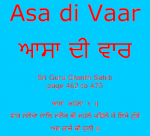Template:AOW173: Difference between revisions
Hari singh (talk | contribs) No edit summary |
Hari singh (talk | contribs) No edit summary |
||
| Line 3: | Line 3: | ||
{{pm|image:Asa di Vaar graphic 2.png|''ballad of hope''}} | {{pm|image:Asa di Vaar graphic 2.png|''ballad of hope''}} | ||
'''ASA KI VAR''', is the term recorded in the index to the [[Guru Granth Sahib]] but this [[Gurbani]] is commonly called ''"Asa di Var"''. It is found in the [[Sikh scripture]] from [http://www.srigranth.org/servlet/gurbani.gurbani?Action=Page&Param=462&english=t&id=20880#l20880 page 462 line 17 to page 475 line 10]. | '''ASA KI VAR''', is the term recorded in the index to the [[Guru Granth Sahib]] but this [[Gurbani]] is commonly called ''"Asa di Var"''. It is found in the [[Sikh scripture]] from [http://www.srigranth.org/servlet/gurbani.gurbani?Action=Page&Param=462&english=t&id=20880#l20880 page 462 line 17 to page 475 line 10]. The composition is by [[Guru Nanak]], the founder of [[Sikhi]] and is usually sung by [[kirtania]] (religious musicians) at [[Sangat|Sikh congregations or gatherings]] as part of the early morning service. | ||
This Var is a heroic ode which describes the brave deeds of a hero. It is generally sung to inspire armies going to battle or to inspire people with martial spirit. The tempo of this bani when sung is very measured and positive inspiring a spirit of [[chardikala]] in the congregation. The [[kirtan]] is very melodious and style as mentioned by [[Guru Arjan]] is called ''"Tunde Asraje Ki Dhuni"'' after the name of the contemporary brave and pious Indian king Asraj. One of the hands of the king was amputated, so he was called Tunda meaning crippled. The deeds and the ode of this king were sung by the bards of the time and these became extremely popular and were adopted for performing the [[Bani]]. | |||
The term ''"Asa di Var"'' comprises three words: The third word [[var]] means an {{w|ode}} or a ''lyrical verse''; the word [[Asa]] which means "hope" in [[Punjabi]]) is also a [[Raag]] or musical measure used in the [[Guru Granth Sahib]]; and ''"ki"'' or ''"di"'' mean ''"of"''. Thus together the terms means ''"A ballad of hope"''. [[Raag Asa]] is the [[Timings For Gurbani Raag|raga of pre-dawn hours]] and the custom of reciting the hymn at morning time is traced to the days of Guru Nanak himself. | The term ''"Asa di Var"'' comprises three words: The third word [[var]] means an {{w|ode}} or a ''lyrical verse''; the word [[Asa]] which means "hope" in [[Punjabi]]) is also a [[Raag]] or musical measure used in the [[Guru Granth Sahib]]; and ''"ki"'' or ''"di"'' mean ''"of"''. Thus together the terms means ''"A ballad of hope"''. [[Raag Asa]] is the [[Timings For Gurbani Raag|raga of pre-dawn hours]] and the custom of reciting the hymn at morning time is traced to the days of Guru Nanak himself. | ||
It is said that [[Bhai Lahina]] (the later, [[Guru Angad]]) was the first to sing it in the presence of [[Guru Nanak]]. {{aowf|Asa di var}} | It is said that [[Bhai Lahina]] (the later, [[Guru Angad]]) was the first to sing it in the presence of [[Guru Nanak]]. {{aowf|Asa di var}} | ||
Revision as of 18:50, 25 August 2008
ASA KI VAR, is the term recorded in the index to the Guru Granth Sahib but this Gurbani is commonly called "Asa di Var". It is found in the Sikh scripture from page 462 line 17 to page 475 line 10. The composition is by Guru Nanak, the founder of Sikhi and is usually sung by kirtania (religious musicians) at Sikh congregations or gatherings as part of the early morning service.
This Var is a heroic ode which describes the brave deeds of a hero. It is generally sung to inspire armies going to battle or to inspire people with martial spirit. The tempo of this bani when sung is very measured and positive inspiring a spirit of chardikala in the congregation. The kirtan is very melodious and style as mentioned by Guru Arjan is called "Tunde Asraje Ki Dhuni" after the name of the contemporary brave and pious Indian king Asraj. One of the hands of the king was amputated, so he was called Tunda meaning crippled. The deeds and the ode of this king were sung by the bards of the time and these became extremely popular and were adopted for performing the Bani.
The term "Asa di Var" comprises three words: The third word var means an ode or a lyrical verse; the word Asa which means "hope" in Punjabi) is also a Raag or musical measure used in the Guru Granth Sahib; and "ki" or "di" mean "of". Thus together the terms means "A ballad of hope". Raag Asa is the raga of pre-dawn hours and the custom of reciting the hymn at morning time is traced to the days of Guru Nanak himself.
It is said that Bhai Lahina (the later, Guru Angad) was the first to sing it in the presence of Guru Nanak. .....More

